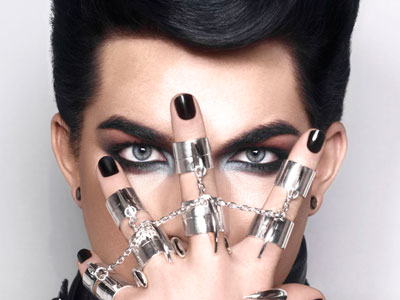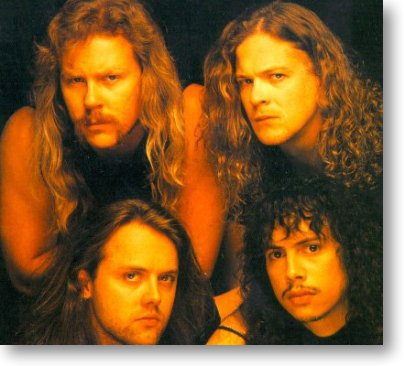So, by now many of you have probably seen (or at least seen reference to) this video of Adam Lambert (he of some or other season of American Idol) performing a cover of Metallica’s “Enter Sandman.” I’m sure with a second’s research I could figure out precisely where and for what purpose this was performed, but I frankly don’t give a shit, and it’s beside the point either way.
The reaction to this video from the heavy metal community, at least as far as I’ve seen, has been, as you might imagine, principally one of outrage, or perhaps even disgust. How dare this man, this purest expression of everything about ‘pop’ culture that heavy metal purports to despise, attempt to infiltrate and appropriate our beloved canon? Alert the village elders (Lemmy, Iommi, Steve Harris), man the ramparts, et cetera, et cetera. All very predictable, and not necessarily wrong.
Still, I’d like to make a slightly different argument, if you’ll be so kind as to humor me. Instead of being shocked, or horrified, or just simply saddened by Mr. Lambert’s very glam take on Metallica, I think that the metal community should, if not embrace it, then at least recognize this performance for what I think it is: A more artistically compelling and frankly dangerous statement than the original song.
First, here is the official music video for Metallica’s “Enter Sandman,” from 1991’s self-titled album:
If you’ve made it through the video without collapsing into a fit of seizures, then bravo. That video is truly a terror to behold (and not in a good way). I’m not quite sure what compelled the director to think, “Oh, instead of filming the same exact action in real-time, let’s make the whole video a stop-motion thing, that’ll be spoooooooky as shit,” but there you are.
Metallica’s song is, of course, widely acknowledged as a “classic,” if for no other reason than it’s been around for a long time, and most everyone knows it. Still, the thing is, it seems to have attained that kind of place in our culture where one is more likely to hear it played over the PA at a giant sports stadium, or at a high school assembly, or maybe even while waiting at the checkout counter of your neighborhood Walmart. It’s safe.
Which is not to say, I should point out, that it was ever really dangerous. By the time the ‘Black Album’ was released in 1991, Metallica was no more danger to anyone than Neil Diamond or soft pillows. If anything, Metallica circa 1991 were the safest sort of rock idols, at least in comparison to the intentionally sloppy, calculatingly scruffy attitude inculcated by the ongoing and/or impending grunge revolution. As opposed to the mopey, “caring-about-anything-is-a-waste-of-time” insouciance of Nirvana or (early) Smashing Pumpkins, the Metallica that toured the ‘Black Album’ was the undiluted expression of the megastar American dreams of every teenager hoping to pull herself up by the (guitar)strap. “Eat your veggies and work hard, kids, and you, too, can be the biggest hard rock band in the world. We’ll even let you grow whatever dodgy facial hair you like!”
The song itself, “Enter Sandman,” flirts with a menacing veneer, but its serpentine half-thrash comes off more like the boogie vibe they would embrace more explicitly in the much- (and probably rightly-) maligned Load/Re-Load albums. In the interest of full disclosure, I ought to say that it’s only with age and wisdom that I’ve come to dislike this song (though my mild disdain for “Enter Sandman” cannot even come close to matching my pure fucking spite for the abomination that is “Sad But True.” Truly, a song that ought to be excised from the annals of rock history, and for which sin its writers deserve far worse penance than making an embarrassingly “let’s-hug-it-out” documentary.) Nevertheless, I do not think it is a particularly good song, trapped, as is most of the ‘Black Album’, in that wretched netherworld in which thrash is kicking to draw its last few ignominious breaths, but has already made halting, sopping nods toward the meatier ‘grooves’ that would come to typify the execrable folly of so much “metal” throughout the 90s.
Here, then, is Lambert’s live performance of “Enter Sandman.” The backing track is a reasonable approximation of the original, though it highlights the plodding, infuriatingly middle-of-the-road riffing slightly more than one would wish. The instrumentation isn’t particularly consequential, though, as the focus is obviously intended to be Lambert’s vocals and physical carriage throughout the song. Thus:
Clearly, the audience here is loving every minute of this (although I suspect they would love each and every minute our [anti]hero spends out on the stage); they’re completely lapping it up, and there’s something oddly charming about the amateur video quality. Lambert sings much of the song relatively straight (har, har), indulging in increasingly melismatic flourishes as the verses and choruses pile on in that inescapable logic of pop songcraft. Lambert is clearly an objectively “better” singer than James Hetfield, although I suppose ardent fans of either man would tell you that that’s not really the point.
To cut right to the heart of my argument, though, make sure you watch Lambert’s vocal histrionics and masturbatory pantomime as the song goes into the solo break about halfway through. Lambert mimics guitar soloing with his voice for a few phrases, but then – hark! – begins gyrating and loving his microphone in that most intimate of ways. A 21st century Elvis, high on self-love instead of fried chicken. Coming out of the solo break, Lambert plants some kisses on one of the musicians before continuing to sing out the rest of the song.
Now, to suggest that many in the heavy metal community will have been turned off by the whole spectacle is not necessarily to imply a pervasive homophobia (though there are likely elements of that for some people). Instead, I assume that some combination of the pageantry, the preening male sexuality, and the theatrical vocal take on a well-established entry in the pantheon of American heavy metal will result in a generalized disdain. I also assume that Adam Lambert doesn’t give a damn about heavy metal, or about the heavy metal community, and that perhaps few of his fans do, either. The issue, then, is all one of context. See, there’s nothing particularly controversial in Lambert’s performing that song to that audience, because they are clearly primed to enjoy every flourish, every note, every gesture of whatever song he decides to sing.
The reason, then, that I want to suggest that Lambert’s take on Metallica is more artistically vibrant is that it takes the warmed-over half-thrash violence of Metallica’s original, and the blandly predatory intent of Hetfield’s snarling recitation of children’s prayers, and turns what has become meek and safe into something dangerous to heavy metal itself. Lambert’s writhing performance takes the implicit leering of Hammett’s wah-soaked (duh) solo and makes it explicit. It’s in your face, as he strokes his microphone like the great digital phallus is always is in every other singer’s hands already. In grafting a gay, glammy sensibility onto this half-heartedly aggressive music, I suspect that Lambert has transgressed the standards held (however subconsciously) by many in the metal community.
(This is not really the time or place for getting into the role of homosexuality in heavy metal – though it is a fascinating, important topic – but perhaps it will suffice to suggest that none of the more prominent gay men in heavy metal – Rob Halford, of course, but perhaps also more recently Gaahl (ex-) of Gorgoroth – have brought this type of sex performance into their public personae.)
Perhaps before closing I should add that I don’t particularly enjoy listening to Lambert’s version of “Enter Sandman.” Despite the criticisms I’ve leveled at Metallica’s original version, I think I’d still prefer it to this half-theatrical, half-tepid version. Nevertheless, it’s at times like this, when popular culture intersects – however briefly, however tangentially – with heavy metal, that both venues stand to learn from the other, or at least for whichever community one prefers to put itself up to a sharp self-assessment. When something like Adam Lambert’s performance, however dull or insipid the actual musical performance may be, can appear so threatening to heavy metal, a genre and community ostensibly drawn to power, danger, and all the rest, heavy metal ought to take a look at itself, and at the transgressive potential it once thrilled to realize.








